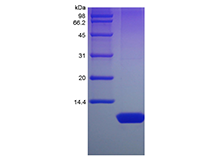Nesfatin is a metabolic polypeptide and is the N-terminal region of the precursor protein, Nucleobindin2 (encoded by NUCB2 gene). It is a naturally occurring protein and originally identified as a hypothalamic neuropeptide. Additionally, Nesfatin can be found in other areas of brain, and in pancreatic isletsβ-cells, gastric endocrine cells and adipocytes. It is responsible for regulating appetite and production of body fat. Excess nesfatin-1 in the brain leads to a loss of appetite, less frequent hunger, a 'sense of fullness', and a drop in body fat and weight. A lack of nesfatin-1 in the brain leads to an increase of appetite, more frequent episodes of hunger, an increase of body fat and weight, and the inability to 'feel full'.

